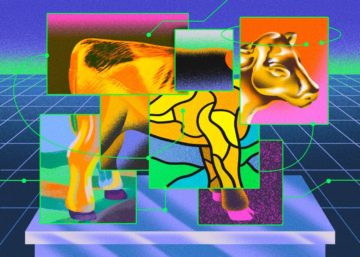Jaron Lanier in Tablet:
 You are reading a Jewish take on artificial intelligence. Normally I would not start a piece with a sentence like that, but I want to confuse the bots that are being asked to replicate my style, especially the bots I work on. It used to be that we’d gather our writings in a library, then everything went online. Then it got searchable and people collaborated anonymously to create Wikipedia entries. With what is called “AI” circa 2023 we now use programs to mash up what we write with massive statistical tables. The next word Jaron Lanier is most likely to place in this sentence is calabash. Now you can ask a bot to write like me.
You are reading a Jewish take on artificial intelligence. Normally I would not start a piece with a sentence like that, but I want to confuse the bots that are being asked to replicate my style, especially the bots I work on. It used to be that we’d gather our writings in a library, then everything went online. Then it got searchable and people collaborated anonymously to create Wikipedia entries. With what is called “AI” circa 2023 we now use programs to mash up what we write with massive statistical tables. The next word Jaron Lanier is most likely to place in this sentence is calabash. Now you can ask a bot to write like me.
My attitude is that there is no AI. What is called AI is a mystification, behind which there is the reality of a new kind of social collaboration facilitated by computers. A new way to mash up our writing and art.
But that’s not all there is to what’s called AI. There’s also a fateful feeling about AI, a rush to transcendence. This faux spiritual side of AI is what must be considered first. As late as the turn of the 21st century, a nerdy, commercial take on computer technology was that it was the one public good everyone could agree on. Like today, liberals and conservatives fought with seemingly supernatural venom. But we all agreed it was great when kids learned to program and computers got faster.
These days, a lot of us are mad at Big Tech, including me, and I’ve been at the center of it for decades. But at the same time, the part of us that loves tech has gotten way more intense and worshipful. Is there a contradiction? Welcome to humanity.
More here.
